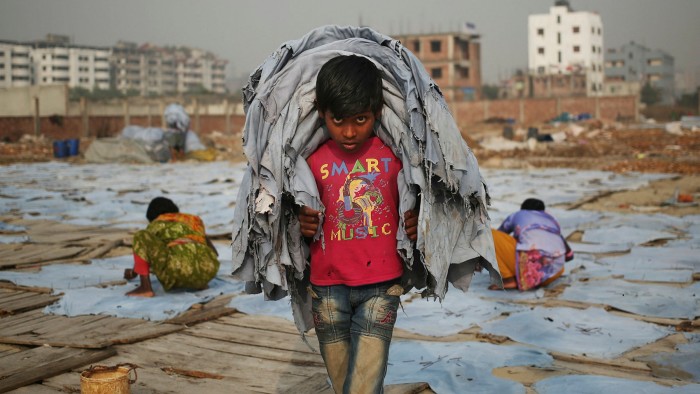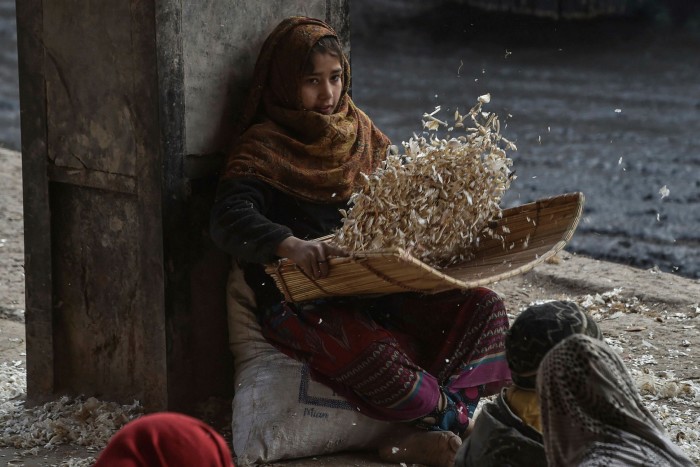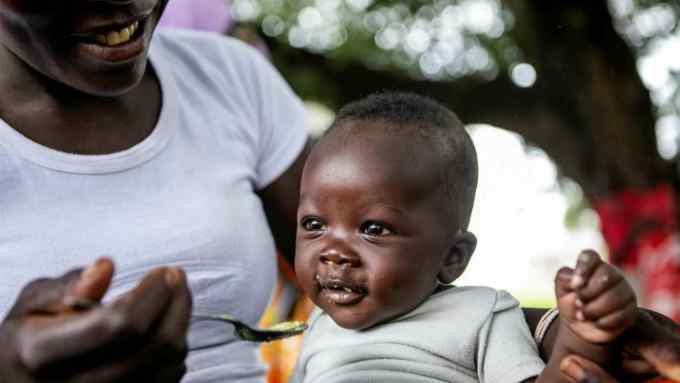Why we must tackle the scourge of child labour

Roula Khalaf, Editor of the FT, selects her favourite stories in this weekly newsletter.
The world that our children inherit will be shaped by agreements reached by governments at the 2021 summits — including the G7, G20 and COP26. And a core focus must be to support their health and wellbeing, including consideration of the trade policies that nations should adopt to build a better future for the world’s children and workers.
The Covid-19 pandemic created an economic crisis driving 8m more Americans below the poverty line in 2020. Globally, the pandemic led to the loss of the equivalent of 255m full-time jobs in 2020, and 119m worldwide slipped into poverty. At least 340m children across the world have vitamin deficiencies. In the US, 13m children face hunger.
Every child, in every country, should have the freedom and opportunity to reach their full potential; to live free from hunger, safe from harm, with the freedom to learn, be healthy and grow up in families that are economically secure. Too many children’s opportunities are destroyed by poverty, conflict, discrimination and the choices made by governments.
A fairer system for children, and a worker-focused system of trade, begins with the premise that supporting the whole child means supporting the whole family. To achieve enduring outcomes, nations must focus on the core issues of worker rights and child labour, as well as the rights of women and girls, and climate change.

Worker rights and child labour
To address the scourge of child labour, we must recognise the root causes: the lack of worker rights, lax enforcement, and the lack of family-sustaining wages for parents. No parent wants to send their child to work, rather than school.
For too long, the global fixation on “cheap” goods has ignored the way in which those goods are produced: with exploitive wages, distorted markets, poor labour conditions, forced labour, child labour, a disregard for the environment, and subsidies.
If democracies ignore the conditions under which global goods are produced, we perpetuate the advancement of authoritarian regimes that thrive on the repression of their own citizens.
The American Federation of Labor and Congress of Industrial Organisations (AFL-CIO), with a coalition of business and non-governmental organisations, is advocating for a global social protection fund. This would create a floor for working conditions, and universal social protection for workers and their families. Stronger protections for workers create stronger societies and social and economic structures for children.
Rights of women and girls
Women and girls face discrimination in nations around the world through laws that restrict their right to own property, to inheritance, to divorce, to child custody, to banking, and to equal access to education. The UN estimates that 2.5bn women and girls live in countries with laws that discriminate against them and 530m women are illiterate. When girls grow up in societies that discriminate against them, they are adversely affected for life. They pay a terrible price. Ultimately, we all pay.
The US Congress is working to reauthorise America’s trade preference programme: the Generalised System of Preferences. The inclusion of measures on women’s economic empowerment, non-discrimination, and human rights are central to that effort. Nations should consider doing the same with respect to their own trade preference programmes, as well as measures related to the ILO convention on violence and harassment in the workplace.
The challenge of addressing the cultural and legal barriers that allow discrimination against women and girls is great. But nations must act together to confront this challenge using every trade, economic and diplomatic tool at our disposal.
Climate change
Climate change is an existential threat to human life that we must address with urgency. The climate crisis will increase economic insecurity and exacerbate conflict.
Trade — and the rules that we establish around the terms of trade as they relate to climate change — will define whether the world embarks on a race to the top, with high standards that prevent the offshoring of pollution, or a race for the bottom, where countries are able to skirt standards.
The objective of reducing global climate pollution is urgent, but will be hollow if workers are exploited in the process. Governments must commit to having workers and unions at the table and upholding climate commitments alongside commitments to workers.
We must recognise that trade has winners and losers. The losses from trade tend to disproportionately impact already marginalised communities, workers, and their children. Policymakers must do more to recognise these disruptive forces and take mitigating action to support communities as they address climate change, localised recessions and adverse trade impacts.
Ensuring fair terms of trade is essential to the effort to “build back better”, globally. These measures will be critical to ensuring children grow up in households where parents are economically secure; in nations where their opportunities are not limited by their gender; and in communities not torn apart by the impacts of climate change.
We ought to consider policy through a simple frame: “How will this benefit a nation’s children?” This question should be our compass as we rebuild our global economic system around the principles of fairness, and embark on a long journey to protect, nurture and educate our children.
The nations of the world have a tremendous opportunity to re-centre policy on the principles of fairness. Let us commit to a path where children and their families are the moral centre of our decision-making; one where the economic and structural conditions provide for a long-term commitment to communities and children; and one where trade is “a force for good”.

Bob Casey is a US senator from Pennsylvania. He serves on the Senate Finance Committee, the Senate’s Health, Education, Labor and Pensions Committee (HELP) and the US Senate Select Committee on Intelligence. He is chair of the HELP Committee’s Subcommittee on Children and Families.
Read his full essay on the Unicef website, here

Comments